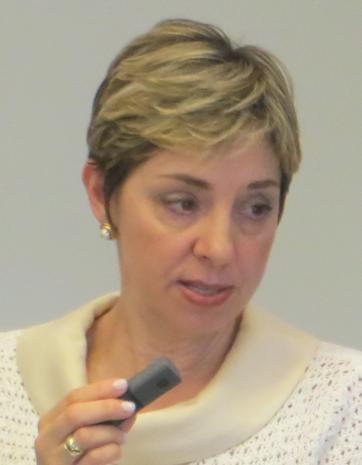Is Egypt Headed for a Civil State or Civil War?
Michele Dunne, Rafik Hariri Center for the Middle East, The Atlantic Council
Photos

Washington, DC—On July 23, 2013, Michele Dunne, vice president of the Atlantic Council and director of the Council’s Rafik Hariri Center for the Middle East, briefed WFPG on the situation in Egypt. Dunne discussed events leading to Morsi’s removal, the future of the Muslim Brotherhood, the role of the military, the interim government, the proposed timeline for elections and constitutional reform, and the prospects for political and economic stability. She also spoke about the US role in Egypt and the implications of Morsi’s removal for the region. The discussion was moderated by WFPG President Patricia Ellis.
In Dunne’s opinion, Morsi’s removal from office constitutes a military coup. She discussed the three main divisions clamoring for control in Egypt: secularists and the military, Islamists, and the state, with the military banding together with the secularists against the Islamists. In her view, excluding Islamists from the political process sends a message to the region that Islam and democracy are incompatible. Dunne also thinks it is unlikely that the timeline for elections and constitutional reforms will be followed; however, she sees the quick formation of an interim government as a positive development.
She discussed the interim government and its makeup and explained that it is supported by the military and does not include any members of the Muslim Brotherhood. Dunne believes that some of the members of the interim government have good intentions, are well-suited to address the country’s economic issues, and have extensive foreign policy experience. She also thinks that some appointees were chosen because of their reputations in the West, like Foreign Minister Nabil Fahmy, who previously served as ambassador to the US. She expressed confidence that the military would not run the government, but that they will step in if violence increases. The Muslim Brotherhood might refuse to take part in the democratic transition, but they will remain a major player in Egypt.
Dunne stressed that US policy towards Egypt must be thoroughly reassessed and built on principles that encourage the country to move towards democracy, inclusion, and reconciliation. She explained that this lack of principles has angered all groups in Egypt. She also discussed the importance of working with Europe, the Gulf countries, and the IMF in developing an aid package for Egypt. The economic situation in Egypt is dire and according to Dunne it will take years to recover, but international aid can assist with emergency stabilization measures.